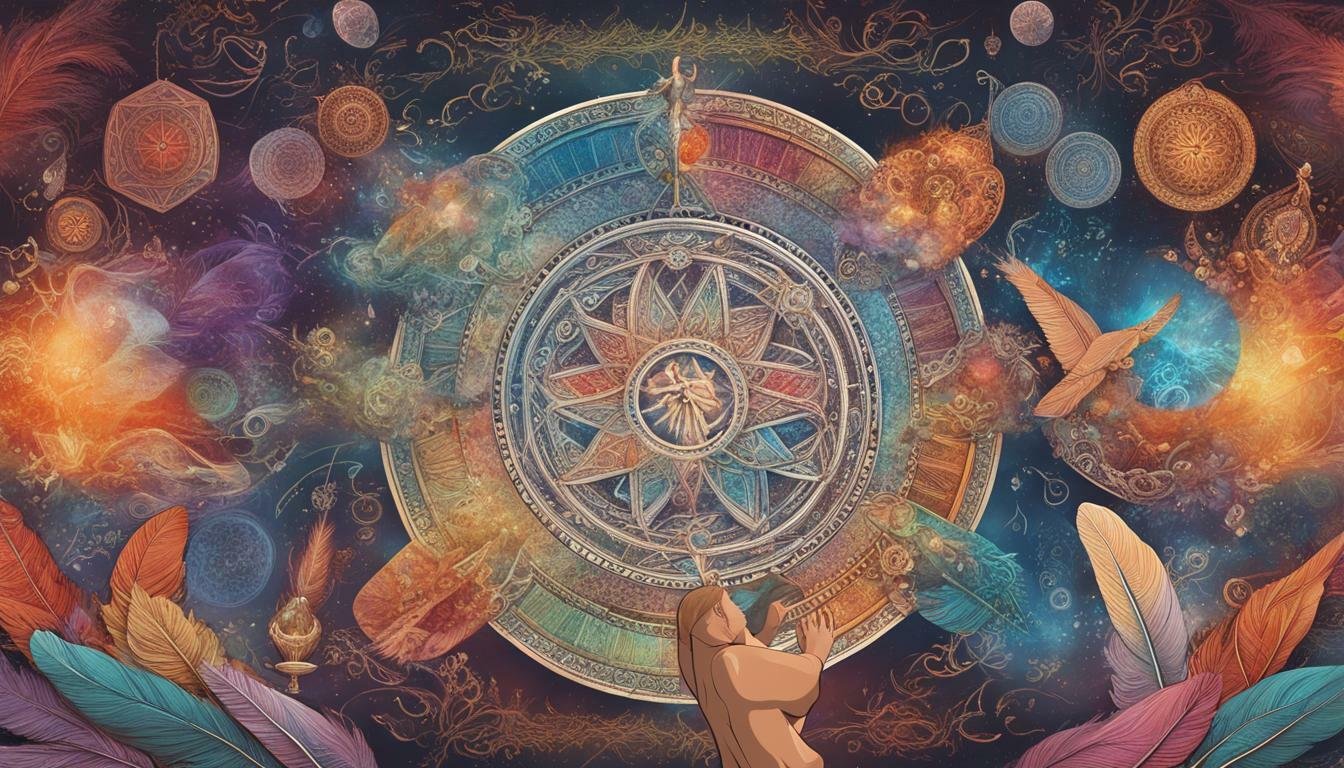
Are you feeling a sense of disconnect or simply seeking a deeper understanding of your beliefs? Exploring your spirituality can be a fulfilling journey that leads to personal growth and a sense of purpose. It’s essential to identify your unique spiritual path, as spirituality goes beyond religious beliefs and encompasses a broader sense of connectedness and fulfillment.
In this article, we’ll guide you through the process of self-discovery and help you understand different spiritual paths. You’ll learn how to assess your personal beliefs and values and uncover your spiritual core. We’ll also offer practical suggestions for nurturing and growing your spirituality.
Key Takeaways
- Discovering your unique spiritual path leads to personal growth and fulfillment.
- Spirituality encompasses a broader sense of connectedness and purpose beyond religious beliefs.
- Understanding different spiritual paths can help you find your own path.
- Assessing your personal beliefs and values is a crucial step in the self-discovery process.
- Uncovering your spiritual core requires introspection and listening to your intuition.
- Embracing your individuality and trusting your inner guidance is key in choosing a personal spiritual path.
- Nurturing and growing your spirituality can be achieved through mindfulness, meditation, spiritual groups, and seeking guidance from mentors.
Understanding Spirituality and Its Significance in Life.
Spirituality is a concept that has been an essential part of human society for centuries. It refers to the search for meaning and purpose in life, as well as the exploration of the deeper aspects of existence. While spirituality is often associated with religion, it goes beyond this and encompasses a broader sense of connectedness and purpose.
Self-discovery of spirituality is significant in personal growth and fulfillment. It can provide a sense of direction, help individuals find meaning in life experiences, and offer a deeper connection to the world and others.
Understanding spirituality is a process of exploring our inner selves and seeking to connect with something higher than ourselves. It involves developing an awareness of our thoughts, feelings, and actions and how they relate to our overall sense of purpose and meaning in life.
Exploring Different Spiritual Paths
When it comes to spirituality, there are many paths and traditions to explore. Each has its unique teachings, practices, and philosophies that can help individuals find meaning and purpose in life.
Buddhism: Buddhism is a nontheistic religion that follows the teachings of Siddhartha Gautama, also known as the Buddha. It emphasizes mindfulness, meditation, and the Four Noble Truths to achieve enlightenment and liberation from suffering.
Hinduism: Hinduism is a polytheistic religion that encompasses a wide range of beliefs and practices. It emphasizes karma, dharma, and the pursuit of ultimate truth to achieve liberation.
Christianity: Christianity is a monotheistic religion that follows the teachings of Jesus Christ. It emphasizes faith, salvation, and the Bible as a source of guidance and inspiration.
New Age Spirituality: New Age spirituality is a diverse and eclectic movement that emphasizes personal growth, self-discovery, and the interconnectedness of all things. It encompasses a wide range of beliefs and practices, such as meditation, energy healing, and astrology.
These are just a few examples of the spiritual paths that exist. It’s essential to explore and learn about different paths to find what resonates with you. You may find that your spiritual beliefs align with one particular tradition, or you may find that your beliefs are a unique blend of various paths.
Exploring Different Spiritual Paths with Open-mindedness
It’s important to approach the exploration of different spiritual paths with an open-minded and curious attitude, rather than judgment or preconceived notions. Remember that spirituality is a personal and subjective experience, and what works for one person may not work for another.
Take the time to study and understand each path’s core beliefs, practices, and philosophies. Attend different religious services or spiritual gatherings to gain a first-hand experience. Read books by spiritual teachers or scholars to gain a deeper understanding of each path.
By exploring different spiritual paths with an open mind and heart, you may gain a broader perspective and appreciation for various beliefs and practices. Ultimately, this can lead to a more profound understanding of your own spirituality and help you find the path that resonates with you.
Assessing Your Personal Beliefs and Values
Before embarking on your spiritual journey, it’s essential to assess your personal beliefs and values. By understanding what you believe and value, you can better identify a spiritual path that resonates with you. Here are some practical steps you can take to assess your spirituality:
- Ask yourself important questions: Take time to reflect on your beliefs and values. Ask yourself questions such as “What is my purpose in life?” “What do I believe about the afterlife?” and “What values do I hold dear?” These questions can help you better understand your spiritual inclinations.
- Journal your thoughts: Writing down your thoughts about your beliefs and values can help bring clarity and awareness to your spirituality. Take time to jot down your ideas in a journal regularly. Over time, patterns and themes may emerge, giving you a better understanding of your spiritual core.
- Meditate: Meditation is an excellent tool for self-reflection and introspection. By quieting your mind and focusing on your breath, you can gain insight into your spiritual beliefs. Set aside time each day to meditate and reflect on your spiritual journey.
Remember, assessing your spirituality is an ongoing process. Your beliefs and values may evolve and change over time, and that’s okay. By regularly taking time to reflect on your spirituality, you can ensure that you are living your life in alignment with your true beliefs and values.
Uncovering Your Spiritual Core
Now that you’ve explored different spiritual paths and assessed your personal beliefs and values, it’s time to delve deeper into your own spiritual core. This is where you’ll find what truly resonates with you and brings you a sense of connection and fulfillment.
Take some time for introspection and self-reflection. Ask yourself what beliefs and values are most important to you. Consider what experiences have brought you a sense of peace and joy. What activities or practices make you feel centered and connected?
It’s important to pay attention to your intuition during this process. This may mean trusting your gut feelings or inner voice, even if it doesn’t align with what others may believe. Remember that your spiritual path is unique to you and may not follow any established tradition.
Listening to Your Inner Guidance
As you uncover your spiritual core, listen to your inner guidance. This can be through meditation, prayer, or simply taking quiet time to reflect on your thoughts and feelings. Pay attention to any insights or messages that come to you.
It can also be helpful to write down your thoughts and reflections in a journal. This can serve as a tool for self-discovery and help you track your progress over time.
Remember, uncovering your spiritual core is an ongoing process. It’s important to continue exploring, learning, and growing as you navigate your spiritual journey. Trust that your intuition will guide you towards the path that is right for you.
Embracing a Personal Spiritual Path
It’s important to understand that your spiritual path is unique to you. It may not fit perfectly with any established tradition, and that’s okay. Embracing your individuality is a key part of honoring your spirituality.
When choosing a spiritual path, trust your inner guidance. Listen to what resonates with you and gives you a sense of connection and purpose. It’s okay to explore different paths before identifying with one. There’s no rush or need to conform to anyone else’s expectations.
Remember that your spiritual path is not set in stone. It may change and evolve as you grow and learn. Be open to new experiences and perspectives, and don’t be afraid to question your beliefs. This ongoing exploration is an important part of your spiritual journey.
Nurturing and Growing Your Spirituality
Once you have discovered your unique spiritual path, it is important to nurture and grow your spirituality to ensure that it stays vibrant and meaningful. There are many ways to accomplish this.
1. Meditation Practices: Meditation is an important tool for cultivating awareness and a sense of calm. It helps you connect with your inner self and achieve clarity about your path. Start with short sessions of five to ten minutes and gradually increase the time. You can use guided meditations, mantras, or visualization techniques to enhance your practice.
2. Mindfulness Exercises: Practicing mindfulness involves paying attention to the present moment without judgment. It helps you decrease stress, increase focus, and become more aware of your thoughts and emotions. Try incorporating mindfulness into your daily routine by engaging in activities like yoga or walking in nature.
3. Join Spiritual Groups or Communities: Being part of a group of like-minded individuals can provide you with support and inspiration. Attend spiritual workshops, retreats, or gatherings to connect with others and deepen your understanding of your path.
4. Seek Guidance from Spiritual Teachers or Mentors: Having a mentor or teacher can help you stay on track and provide insights into your spiritual journey. Consider finding a mentor or teacher who shares your values and can offer support and guidance when you need it.
Whatever path you choose, remember that nurturing and growing your spirituality requires ongoing commitment and effort. Keep exploring your beliefs and values, and be open to new experiences and insights.
Conclusion
In conclusion, discovering your spirituality is a personal and ongoing journey that requires self-reflection and exploration. By understanding spirituality beyond religious beliefs, assessing your personal values and beliefs, uncovering your spiritual core, and embracing your unique path, you can nurture and grow your spirituality authentically.
Remember to be patient with yourself and trust your intuition as you navigate your spiritual journey. You may encounter obstacles or uncertainties, but these are opportunities for growth and deepening your understanding of yourself. Seek guidance and support from spiritual communities and mentors, and continue to seek knowledge and inspiration from a variety of spiritual paths.
Ultimately, living your spirituality authentically can bring a sense of purpose, fulfillment, and connection to yourself and the world around you. Embrace your unique path, and stay committed to your ongoing self-discovery and growth.
FAQ
Q: What is spirituality?
A: Spirituality refers to a sense of connection to something greater than oneself and a search for meaning and purpose in life.
Q: Why is spirituality significant in life?
A: Spirituality plays a crucial role in personal growth and fulfillment, providing a deeper understanding of oneself and the world around us.
Q: How can I explore different spiritual paths?
A: You can explore different spiritual paths by learning about various traditions, attending spiritual gatherings, and engaging in practices that resonate with you.
Q: How can I assess my personal beliefs and values?
A: You can assess your personal beliefs and values by asking yourself reflective questions and utilizing tools like journaling or meditation for self-reflection.
Q: How do I uncover my spiritual core?
A: Uncovering your spiritual core involves introspection, listening to your intuition, and paying attention to what brings you joy, peace, and a sense of connection.
Q: How do I embrace my personal spiritual path?
A: Embrace your personal spiritual path by honoring your uniqueness, trusting your inner guidance, and choosing a path that resonates with your beliefs and values.
Q: How can I nurture and grow my spirituality?
A: You can nurture and grow your spirituality by engaging in practices like meditation, mindfulness, joining spiritual communities, and seeking guidance from mentors or teachers.
- Self Harm Awareness Ribbon Color: Unveiling Its Meaning - August 21, 2023
- What Is Emotional Self Awareness: A Guide to Inner Growth - August 21, 2023
- Self Harm Awareness Bracelets: Show Support and Share Hope - August 21, 2023

